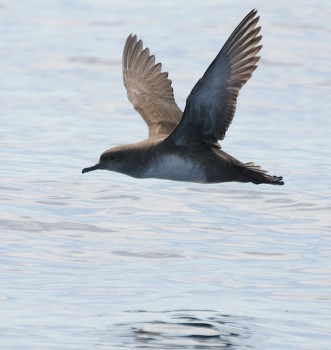Nina O'Hanlon (Environmental Research Institute, University of the Highlands and Islands, Thurso, United Kingdom) and colleagues have reviewed in the journal Environmental Pollution the levels of plastic pollution via entanglement, nest incorporation and ingestion affecting seabirds occurring in the north-eastern Atlantic Ocean. Procellariiform seabirds covered in the paper include the ACAP-listed and Critically Endangered Balearic Shearwater Puffinus mauretanicus (but for which no plastic pollution records were found), along with eight other species of gadfly petrels, shearwaters, a fulmar and storm petrels.
The paper’s abstract follows:
“Marine plastic pollution is an increasing, and global, environmental issue. Numerous marine species are affected by plastic debris through entanglement, nest incorporation, and ingestion, which can lead to lethal and sub-lethal impacts. However, in the northeastern Atlantic Ocean, an area of international importance for seabirds, there has been little effort to date to assess information from studies of wildlife and plastic to better understand the spatiotemporal variation of how marine plastic affects different seabird species. To improve our understanding of seabirds and marine plastic in this region, we completed a synthesis of the published and grey literature to obtain information on all known documented cases of plastic ingestion and nest incorporation by this group. We found that of 69 seabird species that commonly occur in the northeastern Atlantic, 25 had evidence of ingesting plastic. However, data on plastic ingestion was available for only 49% of all species, with 74% of investigated species recorded ingesting plastic. We found only three published studies on nest incorporation, for the Northern Gannet (Morus bassanus) and Black-legged Kittiwake (Rissa tridactyla). For many species, sample sizes were small or not reported, and only 39% of studies were from the 21st century, whilst information from multiple countries and years was only available for 11 species. This indicates that we actually know very little about the current prevalence of plastic ingestion and nest incorporation for many species, several of them globally threatened. Furthermore, in the majority of studies, the metrics reported were inadequate to carry out robust comparisons among locations and species or perform meta-analyses. We recommend multi-jurisdictional collaboration to obtain a more comprehensive and current understanding of how marine plastic is affecting seabirds in the northeastern Atlantic Ocean.”

Balearic Sheawater at sea
With thanks to Alex Bond.
Reference:
O'Hanlon, N.J., James, N.A., Masden, E.A. & Bond, A.L. 2017. Seabirds and marine plastic debris in the northeastern Atlantic: a synthesis and recommendations for monitoring and research, Environmental Pollution. doi.org/10.1016/j.envpol.2017.08.101.
John Cooper, ACAP Information Officer, 06 October 2017

 English
English  Français
Français  Español
Español